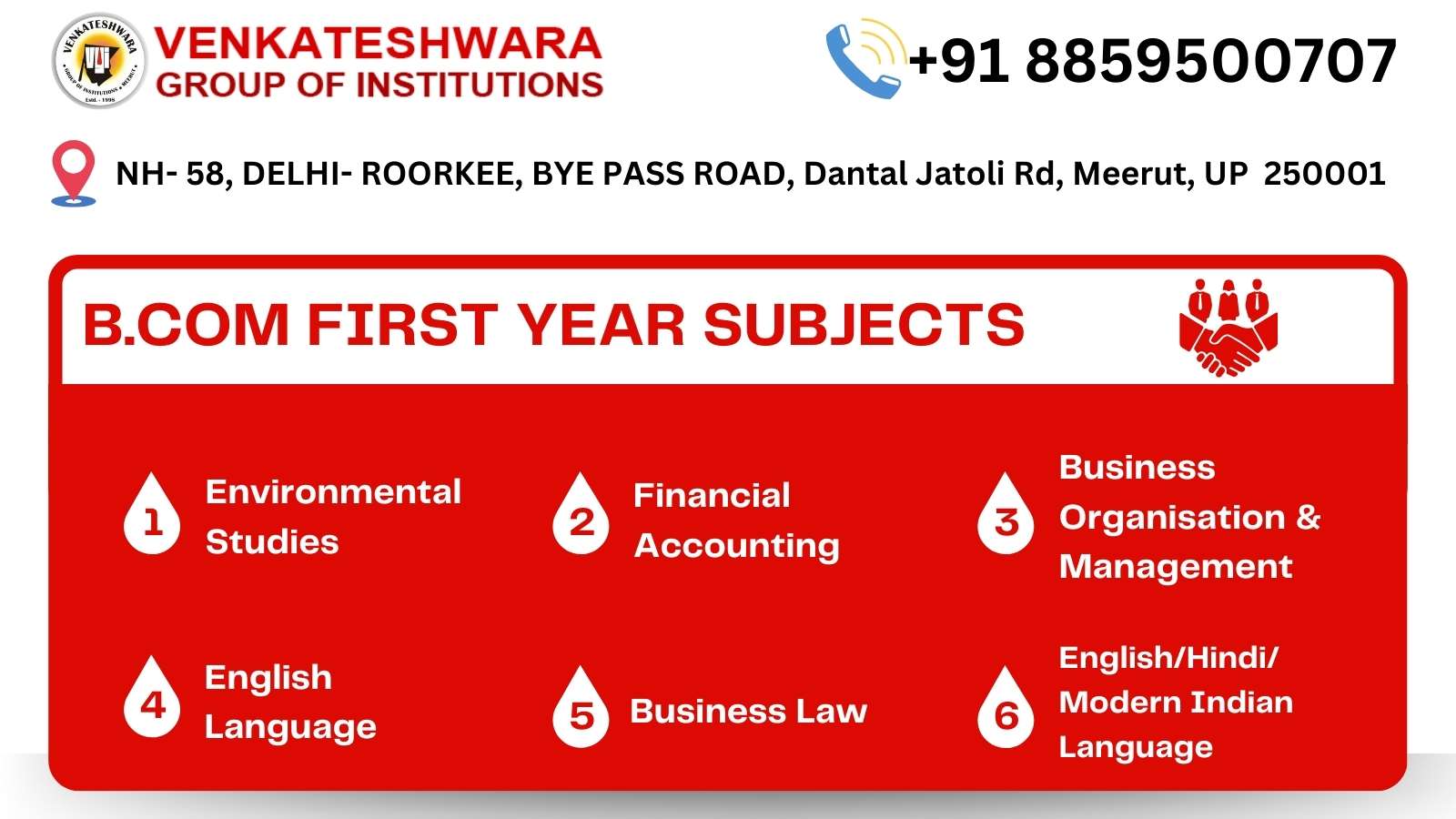B.Com 1st year subjects List 2025: Semester-Wise syllabus & Pdf

Students desirous of doing B.com should be familiar with B.Com 1st year subjects so that they get abreast with them.
The Bachelor of Commerce (B.Com) is a three-year, six-semester course designed to prepare students for roles in accounting, finance, banking, insurance, and related fields.
With India striving to become a 5 trillion $ economy, the demand for skilled accountants will always be there. Every business needs accountants to keep a check on their P/L statements and control their expenses.
In fact, having a qualified accountant is vital because they ensure company’s funds are used in the best possible manner.
Every organization strives to reduce cost because market volatility can affect their profit margins. Hence, the services of an accountant are indispensable for managing the finances of the company.

b.com 1st year subjects
B.Com graduates with expertise in GST, Tally, and other accounting software have an array of career opportunities available to them. The B.Com 1st year subjects are:
- Environmental Studies
- Business Law
- Financial Accounting
- English/Hindi/Modern Indian Language
- Business Organisation & Management
- Business Mathematics & Statistics
- English Language
- Hindi/Modern Indian Language
B.Com 1st year subjects in 1st Semester
The B.Com 1st year subjects in the 1st semester include a mix of core and elective courses designed to provide foundational knowledge in commerce and business. Here is Full Details B.com Subjects 1st year in English
Environmental Studies:
- This subject aims to educate students about the ecosystem and environment. It covers topics like natural resources, biodiversity, pollution, environmental protection acts and sustainable development.
Financial Accounting:
- This subject teaches the fundamentals of accounting. It covers double entry booking of business transactions, trial balance, financial statements like income statement and balance sheet.
- This field delves into topics such as depreciation, inventory value, as well as the accounting aspects of hire purchase and lease transactions.
Business Organisation & Management:
- It provides concepts of business, its types and forms. Functions of management, principles of management and different management theories are covered. Organizational structure and design is also explained.
It also involves analyzing the interrelationship among management functions, such as planning, organizing, directing, and controlling.
B.Com 1st year subjects in 2nd Semester
The B.Com 1st year subjects in the 2nd semester include a variety of core courses that build on the foundational knowledge acquired in the first semester.
Business Law:
- It provides an overview of the Indian contract act, sale of goods act, partnership act, arbitration and conciliation act etc. Students learn about the legalities involved in forming and running a business.
- It manages the implementation of specialized contracts used in various business settings and essentials of online activities under the IT Act.
| The Indian Contract Act, 1872 |
| – The Sale of Goods Act, 1930 |
| – The Limited Liability Partnership Act, 2008 |
| – The Information Technology Act, 2000 |
Business Mathematics & Statistics:
- This subject is quantitative in nature. It covers topics like ratio analysis, interest calculations, linear programming, statistics, probability, sampling methods and time series analysis which are helpful for business decision making.
- It helps to comprehend the correlation and regression between variables, and apply index numbers to real-world scenario.

Why B.com is in high demand
Every business strives to control cost by keeping a check on its expenses. The commerce graduate is ideal for the accountant’s role because they are experts in accounting & book keeping.
Every business operates in a volatile environment where market fluctuations can affect their profit margins. Hence, cutting cost by controlling expenses & optimal utilization of capital is vital for all businesses.
The accounts professional ensures they use the firm’s capital in the most optimum manner to wave off unpredictable market scenarios like the Corona induced lockdown.
Whether it’s a doctor’s clinic or a firm with over 50 employees, a skilled accountant ensures the accounts are clean and reflect the true state of the company’s business.
Why companies hire accountants?
Hiring an accountant is an investment that offers various benefits. Accountants ensure financial organization, accuracy, and compliance, while also assisting with tax optimization.
Their valuable insights into financial matters contribute to informed decision-making and support business expansion.
Though it’s not compulsory to hire an accountant but entrusting a person for accounts ensures businesses can focus on their work without worrying about expenses.
What is the B.Com Syllabus
The B.com syllabus With Pdf, as stipulated by UGC, is:
B.Com Syllabus PDF Link : https://www.ugc.gov.in/pdfnews/1805048_Final-B.-Com.pdf
Earning potential & Career Prospects
A B.Com fresher earns somewhere between INR 5–8 lakhs & after a few years of experience, their salary increases. Further, they can augment their qualification by pursuing M.Com, CA, CFA, CS or MBA as per their interest.
Skilled B.Com graduates have increased employment opportunities in India because of the presence of audit firms such as Deloitte, McKinsey, and GE Capital, which hire them in large numbers.
With India being a prominent BPO center, B.com graduates find employment in Transaction Processing, E Funds & overseas financial firms.
After completing their B.Com, students have a multitude of skill development courses to choose from, such as digital marketing, computerized accounting, GST, and computer applications.
These courses offer wide-ranging applicability, and the opportunities for growth are limitless.
Eligibility: 10+2 with 33% marks (Eligibility – Commerce, Arts, and Science)

Career Options after B.Com
After earning a B.Com degree, you have several career options.
These include accountant, business executive, financial analyst, tax consultant, accounts manager, business consultant, finance manager, chartered accountant, company secretary, chartered financial analyst, certified management accountant, certified financial planner, bank manager, or even a teaching position.
Can I Pursue CA after B.Com
Certainly! After completing BCom, individuals can pursue a Chartered Accountancy (CA) qualification.
They can opt for the Direct Entry Scheme, which allows them to skip the Foundation level of the CA course and start at the Intermediate level.
How to get a bank job after B.Com
BCom graduates can secure jobs in banks by passing competitive exams like IBPS PO, RBI Grade B Officer, SBI PO, SBI Clerk, and IBPS Clerk.
Salaries of different roles after B.Com
|
BCom Jobs
|
Average salary*
|
|---|---|
|
Firstly, Jr Accountant
|
INR 2.4 LPA
|
|
Accountant
|
INR 3.2 LPA
|
|
Further, Account Executive
|
INR 3.8 LPA
|
|
Moreover, Business Executive
|
INR 3.5 LPA
|
|
Financial Analyst
|
INR 5.8 LPA
|
|
Tax Consultant
|
INR 7.1 LPA
|
|
Financial Consultant
|
INR 6 LPA
|
|
Accounts Manager
|
INR 8.6 LPA
|
|
Business Consultant
|
INR 13.7 LPA
|
|
Finance Manager
|
INR 16.8 LPA
|
|
Financial Analyst
|
INR 5.8 LPA
|
|
Chartered Accountant
|
INR 10.5 LPA
|
|
Company Secretary
|
INR 8.7 LPA
|
|
Chartered Financial Analyst
|
INR 10 LPA
|
|
Certified Management Accountant
|
INR 6 LPA
|
|
Financial Risk Manager
|
INR 11.5 LPA
|
|
Certified Financial Planner
|
INR 3.9 LPA
|
|
Bank Manager
|
INR 9.4 LPA
|
|
Finally, Commerce Teacher
|
INR 3 LPA
|
At this point, the write up should convince you that B.Com is essential for a stable and lucrative career, as it’s relevant across various sectors. Visit the best B.Com College in Meerut and get ready for a successful career in the field of commerce and accounting.
FAQ About B.Com 1st year subjects
In the BCom 1st year, students typically study subjects such as Financial Accounting, Business Organisation and Management, Business Law, Business Economics, Business Mathematics and Statistics, Environmental Studies, and Business Computing
The difficulty of BCom can vary depending on the individual’s academic background, skills, and interests, but in general, it is considered a challenging degree that requires a strong foundation in accounting, economics, business administration, and finance
The number of subjects in the first year of a bachelor’s degree typically ranges from 5 to 6, with 2-3 core subjects and 2-3 foundation subjects
No, BCom is still a 3-year undergraduate degree course in India, except for distance learning BCom which can be completed in 4 years






